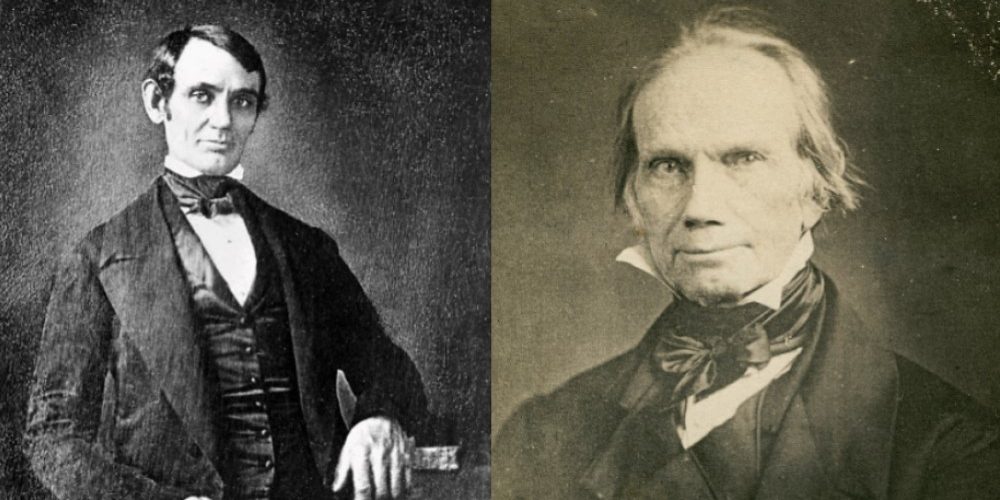The oldest emergency proclamation dates to the Carter Administration, 40 years ago. Two generations of crisis are enough.
What Henry Clay Taught Lincoln
In 2012, a group of historians was at a loss about how to honor Abraham Lincoln on his birthday. Lincoln routinely lands atop presidential rankings and is one of the most biographed persons in world history. The group decided to create a statue of books written about Lincoln: they included less than half of the books written about him, and the statue still towered to the height of 34 feet. It is difficult to say something new or interesting about a man who has been so widely studied; nevertheless, Dr. Michael J. Gerhardt manages the task. Of all the books I have read about Lincoln, I have yet to encounter a better portrait of Lincoln, young Whig.
Throughout Lincoln’s Mentors, Gerhardt turns over stones that have been long neglected: he takes a look at Lincoln’s early years in Illinois politics, introduces the reader to a handful of Lincoln’s mentors, and details the way in which Lincoln worked his way into politics and up the ranks of the Whig party. Some of these counselors were friends from Illinois, some later became rivals, and some were men that he never even met.
Lincoln the Whig
In Gerhardt’s account, the two Illinois Whigs who most guided Lincoln were John Todd Stuart and John J. Hardin. Stuart campaigned for Henry Clay alongside Lincoln, encouraged him to study law, became his law partner for almost ten years, and helped Lincoln win a seat in the state legislature in his second campaign. Hardin was a distant cousin of Mary Todd Lincoln, he saved Lincoln’s life when Lincoln foolishly accepted a duel with a trained fencer, and defeated Lincoln for the Whig nomination for U.S. House in Lincoln’s first run. Gerhardt points to several other of Lincoln’s associates in Illinois politics—all Whigs—such as Orville Browning and Stephen Logan. Like Stuart, Browning helped Lincoln develop into a successful lawyer and Lincoln learned from Logan when they rode the Illinois circuit together.
Although the book mentions several Illinois Whigs with whom Lincoln associated, it focuses most heavily on the influence of Henry Clay, the man Lincoln called his “beaux ideal of a statesman.” Gerhardt notes that Lincoln was drawn into Whig politics because of his fondness of Clay. Perhaps Lincoln’s other mentors were, therefore, a mere consequence of his Whiggishness, and his love of Clay’s statesmanship.
Gerhardt pulls the reader through the ins and outs of Whig politics in Illinois, detailing Lincoln’s rise through the party, his campaigning experience for Clay, his role in urging the Whig party in Illinois to adopt rotation in office as its principle for the U.S. House, and even his debates over national policy during his several campaigns, both for Clay and for himself. Gerhardt does a phenomenal job of telling the reader about the men who were Lincoln’s mentors, but he does not explain how or why they are all united.
The best way to understand how they are united is by looking at Lincoln’s relationship with Clay. One of the very first things that Gerhardt addresses is the fundamental political tension throughout Lincoln’s early life—that between the Whig vision and the Jacksonian vision for American character. In Chapter 2, Gerhardt makes a very important distinction: he describes Jackson as a champion of the “common man” and Clay as he who “had coined the concept of ‘the self-made man…’” Throughout the book, Gerhardt argues that the concept of the self-made man resonated with Lincoln. According to Gerhardt, the common man represented those who Jackson “believed he exemplified—the poor, illiterate, disenfranchised, hardworking men, who were born with nothing but worked with their hands . . . ” The self-made man, on the other hand, was “an ideal that inspired young Whigs like Lincoln to seek to improve themselves through hard work, self-discipline, and social respectability”—the key difference between the two visions being self-improvement and social respectability.
Although the question of slavery is at the heart of any study of Lincoln, Gerhardt rightfully places the greatest emphasis on the Whig criticism of demagoguery.
The Whig party continually lost elections (especially in Illinois), though not from lack of effort by young Lincoln. What is perhaps most masterful about Gerhardt’s account is that it explains Lincoln as a political tactician who learned from failure, who cared deeply about organizing and winning elections, and who understood political realities. He shows how Lincoln learned from Clay’s many political blunders. For example, Gerhardt singles out Clay’s desire “to take a stand on the Texas issue before Van Buren could” in 1844. Clay firmly believed that America ought not enter a war with Mexico over the Texas territory because he believed that many of the war’s backers primarily wanted to extend slavery westward. Clay published a “fateful letter” containing an overly legalistic argument as to why America had no right to Texas. Near the end of the letter, he explained that asserting ownership of Texas was historically and legally absurd “if not dishonorable.” Clay expected the presumptive Democratic nominee Van Buren to take the same ground as himself, which he did. What Clay did not anticipate was Jackson endorsing James K. Polk, thus dooming Van Buren, making Texas a pivotal issue in the South, and leading to Clay’s narrow presidential defeat. Gerhardt explains,
Later as a candidate for the House and still later for the presidency, Lincoln would be a model of self-control, relentlessly staying on message and otherwise saying nothing, while party leaders, the party faithful, and Lincoln’s surrogates reassured constituents that he was their best bet. Clay’s mistakes would be among the most lasting lessons Lincoln learned from his mentor.
Though Lincoln learned from Clay throughout his life, experience was Lincoln’s best teacher when it came to winning elections.
Lincoln’s Political Philosophy
One of the book’s greatest strengths, however, perhaps gives way to its greatest weakness: in explaining Lincoln’s political mind, it neglects Lincoln’s political philosophy. For example, Gerhardt writes, “Many of Lincoln’s closest associates, perhaps all, missed the fact that Lincoln was fundamentally a pragmatist. . . . Lincoln’s hero, Clay, had been the same.” In the same paragraph, Gerhardt goes on to say that “[Lincoln’s] moral imperative, particularly when it came to opposing the extension of slavery, remained his compass.” Yet Gerhardt never goes so far as to explain why Lincoln adopted this moral imperative, nor does he tie this claim back to the primary story that he is telling: the story about Lincoln, Clay, and the Whigs.
However, Lincoln admitted that he leaned heavily on Clay and the Whigs for his understanding of liberty. In his eulogy for Clay, he claimed that Clay’s “all controlling passion” was “liberty for all.” In his debates with Douglas, he quoted Clay 41 times. He explained that he could argue his stance on slavery only using quotes from Clay. He argued that Douglas was most blameworthy for repealing the Missouri Compromise, the act that Clay championed and for which he became known as “the great compromiser.” Yet it is not clear how Lincoln could rely so heavily on Clay for his position on slavery when Clay was a slave owner.
Although the question of slavery is at the heart of any study of Lincoln, Gerhardt rightfully places the greatest emphasis on the Whig criticism of demagoguery. He shows that Lincoln and Clay aligned rhetorically and ideologically in their criticism of tyrants. This can perhaps be elucidated with recourse to two speeches from Lincoln and Clay, Lincoln’s Lyceum Address (1838) and Clay’s speech against the Seminole War (1819). Gerhardt discusses the Lincoln speech in his book, but he never alludes to the Clay speech. This is odd for two reasons: first because Gerhardt addresses the Jackson-Clay-Lincoln dynamic throughout the book, and second because Lincoln relied on this speech throughout his life, but particularly when he made the argument in his Lyceum Address.
In 1819 Clay gave a speech urging Congress to censure Jackson after he had invaded Florida with his militia, burnt two Seminole villages to the ground, and executed two foreigners by military tribunal. In the speech he says,
Do you expect to execute this high trust (of the Declaration) by trampling, or suffering to be trampled down, law, justice, the Constitution, and the rights of the people? by exhibiting examples of inhumanity and cruelty and ambition? When the minions of despotism heard, in Europe, of the seizure of Pensacola, how did they chuckle, and chide the admirers of our institutions, tauntingly pointing to the demonstration of a spirit of injustice and aggrandizement made by our country, in the midst of an amicable negotiation! Behold, said they, the conduct of those who are constantly reproaching kings! . . . Beware how you forfeit this exalted character. Beware how you give a fatal sanction, in this infant period of our Republic, scarcely yet twoscore years old, to military insubordination. Remember that Greece had her Alexander, Rome her Caesar, England her Cromwell, France her Bonaparte, and that if we would escape the rock on which they split we must avoid their errors.
Aside from Clay’s phrase that the nation was “twoscore years old,” and his identification of “the rock on which” the union would split—both tropes Lincoln employed to greater success—there are further similarities. Compare that speech with what Lincoln says almost 20 years later in his Lyceum Address, observing the effects of Jackson’s “towering genius.” Lincoln begins with a discussion of the spirit and habits that animated the revolution. He goes on to say that,
This field of glory is harvested, and the crop is already appropriated. But new reapers will arise, and they, too, will seek a field. It is to deny, what the history of the world tells us is true, to suppose that men of ambition and talents will not continue to spring up amongst us. And, when they do, they will as naturally seek the gratification of their ruling passion, as others have so done before them. The question then, is, can that gratification be found in supporting and maintaining an edifice that has been erected by others? Most certainly it cannot. Many great and good men sufficiently qualified for any task they should undertake, may ever be found, whose ambition would inspire to nothing beyond a seat in Congress, a gubernatorial or a presidential chair; but such belong not to the family of the lion, or the tribe of the eagle. What! think you these places would satisfy an Alexander, a Caesar, or a Napoleon?—Never! Towering genius distains a beaten path. It seeks regions hitherto unexplored.—It sees no distinction in adding story to story, upon the monuments of fame, erected to the memory of others. It denies that it is glory enough to serve under any chief. It scorns to tread in the footsteps of any predecessor, however illustrious. It thirsts and burns for distinction; and, if possible, it will have it, whether at the expense of emancipating slaves, or enslaving freemen.
The rhetorical similarity is fascinating—both Lincoln and Clay address the danger of towering genius and compare their opponents to ambitious men throughout history who are to blame for the loss of liberty—but what is most fascinating is that following their critique of ambition, each espouses the same vision for self-government and the character of the people. Clay argued that Jackson’s carelessness for the boundaries inherent in the Constitution would give up the “sacred trust” of self-government. Lincoln began the Lyceum speech remarking on the habituation of the public toward mob rule. Lincoln urged the public: “As the patriots of seventy-six did to the support of the Declaration of Independence, so to the support of the Constitution and Laws, let every American pledge his life, his property, and his sacred honor.” In 1838, after Jackson’s presidency, Lincoln picked up where Clay left off. As he does years later in the Gettysburg Address, he attempts to rededicate the people to the Declaration and the principle of self-government that issued therefrom, the same “high trust” that Clay identified in his critique of Jackson.
Admittedly, such a detour into political philosophy would distract the reader from the story that Gerhardt tells. Gerhardt’s account provides the essential background to understanding Lincoln’s rise to statesmanship. It is not possible to understand Lincoln without understanding his Whiggism and his departure therefrom. Yet, in Gerhardt’s account, it is not exactly clear what Whiggism is. Admittedly, it was not exactly clear what Whiggism was even to many Whigs themselves. Nevertheless, Gerhardt has paved the groundwork by showing who Lincoln’s mentors were, and it is up to future scholars to understand why they matter.



